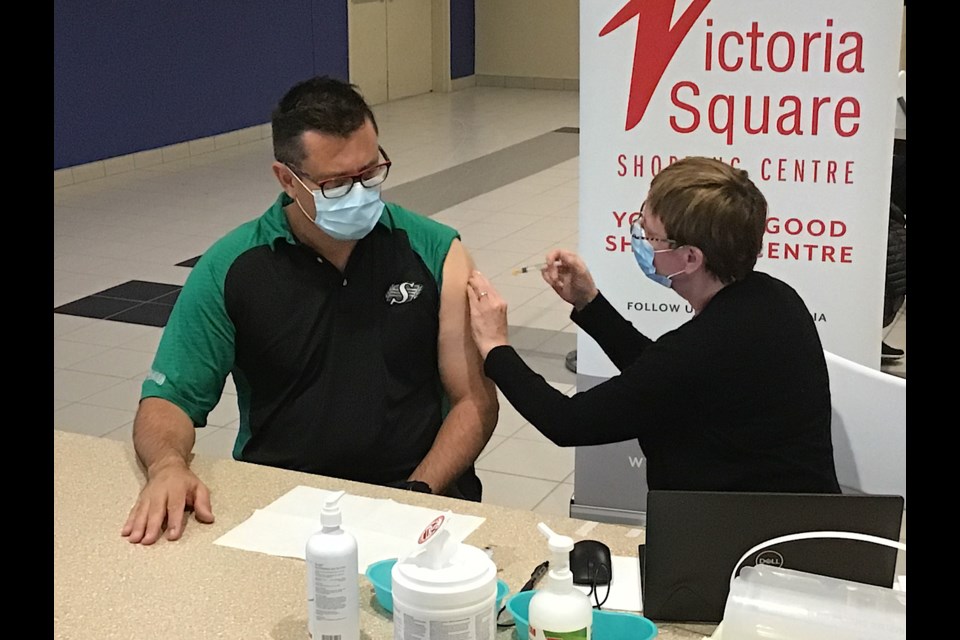REGINA — Residents are now able to get their annual flu shots at clinics throughout Saskatchewan.
Flu shots became available as of Oct. 11 at public health clinics physician and nurse practitioner offices and in local pharmacies.
The shots are available to those aged six months or over. The province also says eligibility for the high-dose influenza vaccine Fluzone is expanded to all residents age 65 and older.
People can also get both the flu shot and COVID-19 shot done in one session. The province states all Saskatchewan residents can book the entire family’s flu and COVID-19 vaccinations online in one appointment. People can call 1-833-SASKVAX (1-833-727-5829) to book family appointments. Walk-in clinics will also be available.
Health Minister Paul Merriman and the province’s Chief Medical Health Officer Dr. Saqib Shahab were at the vaccination clinic at Victoria Square Shopping Centre in Regina to promote the free vaccines.
Both Merriman and Dr. Shahab received their flu shots during that visit. Afterwards, both spoke to reporters about the benefits.
“I feel fine,” said Merriman after getting the needle poked in his arm. The health minister did not expect there would be “vaccine fatigue” of people deciding not to take the annual shot.
“I don’t think so,” said Merriman. “Vaccines have been the topic of conversation for the past couple of years. People need to know that it’s very important to get this flu vaccine to protect themselves.”
Dr. Shahab noted the importance of getting the flu shot due to the high prevalence of flu seen in other countries.
He noted Australia saw “an early and significant influenza season as well as COVID transmission.” Dr. Shahab said we should prepare for an early flu season, and not to delay getting flu vaccine.
“What we are seeing right now in the northern hemisphere is a handful of influenza cases, even in Saskatchewan. So this is exactly the right time to get your bivalent COVID shot, but also your flu shot as I got today.”
Dr. Shahab also confirmed a change is coming effective this week to the EPI reports of COVID-19 cases. Instead of monthly report, it will now be every couple of weeks, and they will include updates not only on COVID-19 but other respiratory viruses including the flu.
He gave a bit of a sneak peek into what that report would contain, with the first one set to be released Thursday. Dr. Shahab said the COVID test-positive rate has come down to 10 per cent, but also noted a third of the cases are other respiratory viruses. He urged people to take those seriously as well.
“They should still stay home until they’re better, even if it’s not COVID,” said Dr. Shahab. “It’s good to be aware of all those.”
As for COVID-19, he said the measures are the same — get your vaccine, wear a mask if you choose, and stay home if unwell. He is also advising people to stay up to date on their COVID-19 vaccine, and that they should get a bivalent if it’s been four months or more since your last COVID-19 vaccine.
“It doesn’t matter how many doses you got in the past,” said Dr. Shahab.
Regarding the latest versions of COVID-19 vaccines, both Merriman and Shahab indicated that it is expected the newest Pfizer bivalent vaccines just approved by Health Canada, which targets the original strain as well as the current BA.4 and BA.5 Omicron strains, should be available next week. Dr. Shahab urged people to stay tuned for further information about that.
Dr. Shahab said the first bivalent vaccine, the Moderna vaccine based on the Omicron BA.1, became available a few weeks ago and he said he got that vaccine right away, as he didn’t want to wait any longer than necessary.
He acknowledged people “are in different places” right now when it comes to vaccines, with some getting the flu shot right away and opting to wait for a Pfizer bivalent vaccine, while others will want to get the COVID-19 vaccine right away.
“All of these decisions are fine,” said Dr. Shahab. “People can choose to get whatever bivalent they want.”
Dr. Shahab also has some advice about how to sift through all the conflicting information on social media, some of which may not be reliable.
“I think people should check the source of any information, is it a credible source,” said Dr. Shahab. He suggested people look at sources like Public Health, the Saskatchewan government, the Saskatchewan Health Authority or HealthLine 811. He also suggests speaking to a doctor or pharmacist.
“It is a challenge but I think most people are able to sift through what’s credible information and what’s not,” said Dr. Shahab.




